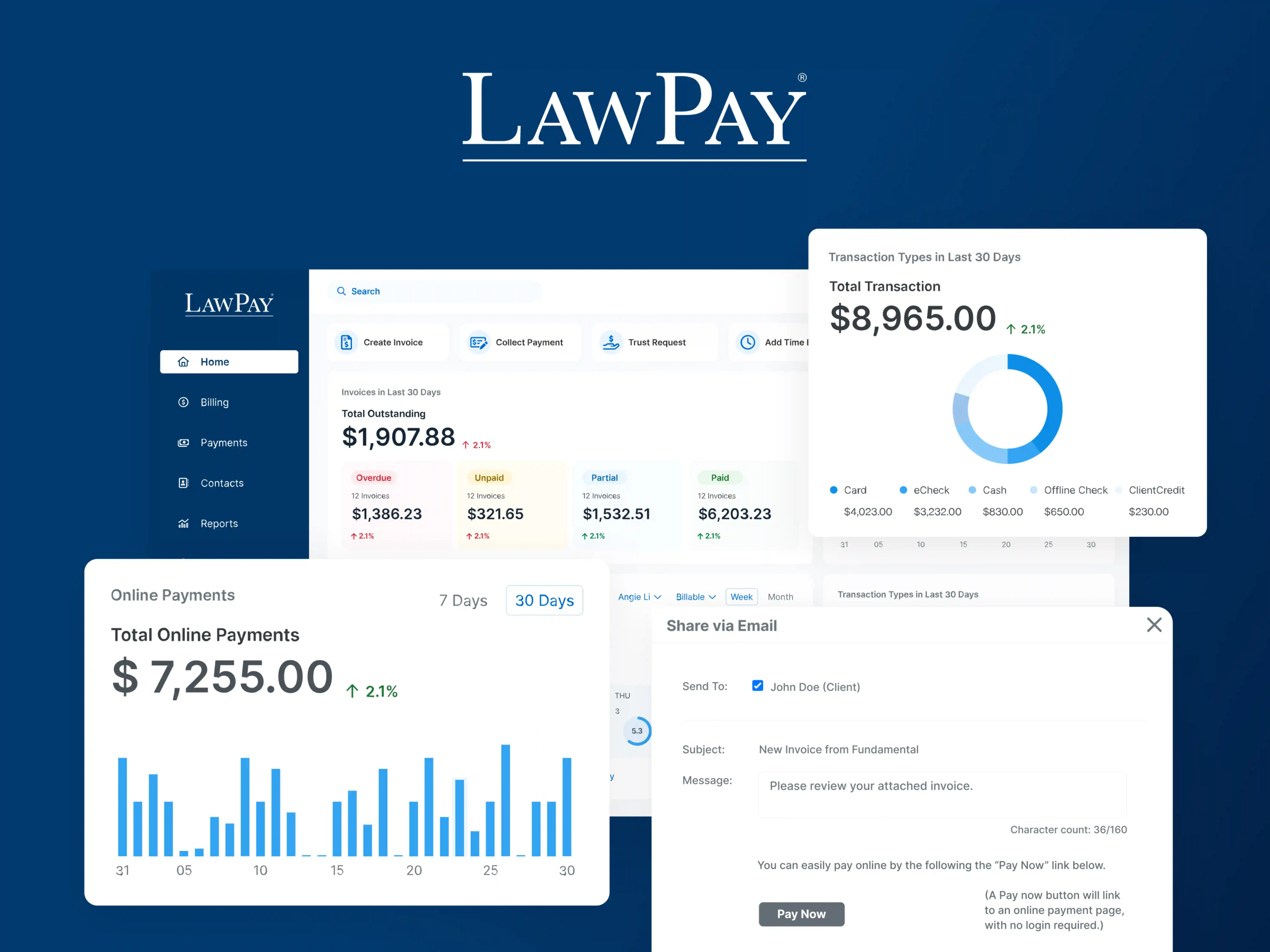Promoting law firms can be the work of high-priced agencies and consultants, but that’s not the only way to succeed. Not every firm wants or needs a set of slick campaigns to win new clients. Many can thrive with cost-efficient, in-house marketing programs—including small firms and solo practitioners.
It all starts with understanding the basics of attorney marketing. Whether your firm outsources these activities or handles them in-house, consider this guide your ultimate resource. Learn what law firm marketing is, how it benefits the firm, key marketing terms to know, and strategies to manage marketing efficiently.
Schedule a demo to see what LawPay can offer your firm.
Book Now
What Is Law Firm Marketing?
Lawyer marketing encompasses the activities designed to promote the firm and win new business. Examples include building and maintaining a website, paying for advertising online or offline, sending emails to prospective and existing clients, and encouraging happy clients to write reviews and refer their friends.
Do Law Firms Need Marketing?
Yes, law firms need marketing. Law is a competitive field and firms that don't market sufficiently risk being left out of contention for new business opportunities.
But a good, memorable marketing effort can also plant seeds for future business.
Even in less competitive regions and disciplines, marketing generates brand awareness for the firm. Ideally, marketing messages reach prospective clients just when they're in need of legal representation. A good, memorable marketing effort can also plant seeds for future business. When someone internalizes a practice’s name after engaging with its marketing campaigns, that firm will be in the running if that person needs a lawyer later.
How Can Marketing Benefit a Law Firm?
Law firm marketing has three important benefits. First and most obvious, marketing can bring in new clients. Effective marketing for lawyers also defines and reinforces the firm's brand image and supports market research efforts.
Gain More Clients
Law firms don't fare well without an ongoing flow of new clients. The high-level goal of attorney marketing is to build that flow—or, in marketing speak, a new business pipeline. That pipeline fuels the firm's growth and success over time.
Marketing for lawyers must effectively accomplish two objectives to gain new customers:
Let the right people know the firm is available
Define and reinforce the firm's unique selling position and branding
Expand Brand Recognition
Good branding communicates the level of service and expertise the firm provides. Marketing supports a firm's branding efforts through repetition.
Prospective clients can be introduced to nearby law firms through social media posts, online ads, radio spots, and banners at the local tennis courts, for example. When those messages consistently present a compelling brand, prospects are more likely to remember that firm's name at the right moment.
Ultimately, prospects only convert into paying customers when they believe the firm can successfully address their issue. Branding is what instills that belief, and marketing spreads the word.
Improve Market Research
Law firm marketers build their initial campaigns from assumptions about what motivates their ideal client. The campaign outcomes then prove those assumptions right or wrong.
Of course, no marketing campaign will be 100% right or 100% wrong at the start. Marketers will adjust the messaging and placement over time to maximize the results relative to the cost. That optimization process generates important information about prospects, such as what messaging they find compelling and what information they need to convert into clients.
Overall, these marketing insights contribute to better customer service—because you're more in touch with your clients and their pain points. Over time, the higher level of service will have a higher likelihood of generating more referrals and repeat business.
Marketing Terms Lawyers Should Know
Marketing, like law, is a complex discipline. Understanding a few basic terms can help solo lawyers develop low-cost marketing approaches. Or, for those who intend to outsource these efforts, knowing the basics facilitates more productive conversations with consultants who specialize in marketing for lawyers.
Below are six marketing terms every lawyer should know.
1. Lead
A lead is a potential client who has shown interest in working with the firm. Leads are identifiable in that they have provided their personal information. They might have filled out a form on the firm's website, called the office, or sent a message through social media.
The process of collecting leads is called lead generation. Most law firms generate leads through multiple channels, such as referrals and paid advertising.
Leads usually don't become clients immediately. They normally will research the firm and other options before they're ready to sign an agreement. A law firm marketing plan should account for this by incorporating "lead nurturing" actions that help prospects move through their decision-making. Lead nurturing usually involves sending prospective clients helpful content via email. For example, you might send out a guide to choosing the right law firm or tips on interviewing prospective lawyers.
Note that an important aspect of lead nurturing is having a lead management system, like MyCase, that tracks your outreach efforts by prospect. MyCase also simplifies the transition from prospect to client with a built-in intake system.
2. Search Engine Optimization
Search engine optimization, or SEO, is the practice of improving a website so that it appears more often in search engine results. A family law firm, for example, would benefit from showing up when people search Google for "divorce attorneys near me" or similar keyword phrases.
3. Pay-Per-Click
Pay-per-click, or PPC, is paid online advertising. It's most used to appear in search engine results for specific queries, so people click on the ad and visit the advertiser's website. Advertisers pay for each ad click.
Both SEO and PPC achieve the same result, which is more visitors to the advertiser's website. Marketers often use the two strategies together to amplify overall results.
Both SEO and PPC achieve the same result, which is more visitors to the advertiser's website. Marketers often use the two strategies together to amplify overall results.
4. Landing Page
A landing page is a website page that is optimized to generate or convert leads. Best practice is to use a landing page as the destination for clicks on PPC ads. Law firms can also leverage landing pages to receive and convert SEO traffic.
5. Call to Action
A call to action, or CTA, is a phrase that directs readers to engage in some way. Common examples include "buy now," "download the free report," or "contact us." Online, CTAs are often displayed on boldly designed buttons to stand out.
Landing pages should have at least one CTA. If there is more than one CTA, the options should be prioritized visually through design.
For example, a law firm might prefer website visitors to set an appointment immediately. But if they're not ready for an appointment, the landing page could also offer a free download of an educational guide as a lower-commitment action that engages them with the firm. The "set an appointment now" CTA would be visually more prominent on the page than the "download now" CTA.
6. Sales Funnel
A sales funnel is a conceptual map of the prospect-to-client progression. Generally, there are four stages involved:
Awareness
Interest
Desire
Action
Defining what these stages look like for your clients can help you understand where to use your marketing resources.
Let’s say the data shows that a high percentage of website visitors convert into clients, but the firm still isn't bringing in enough new business. The shortfall in that scenario could be in the awareness stage—not enough people know enough about the firm to visit the website. The solution may be to invest in SEO and, possibly, PPC.
Types of Law Firm Marketing
SEO and PPC are tactics that fall into two different types of digital marketing. SEO is organic marketing, while PPC is paid marketing. Those aren't the only two options, however. Law firm marketers also commonly implement social media marketing, sponsorship marketing, and television advertising.
Let's look at each of these.
Organic Marketing
Organic marketing for law firms includes strategies that gain exposure without paid advertising. SEO is a core component of organic marketing because it can deliver a large audience at a relatively low cost. Other organic campaigns are more limited in their reach.
For example, your organic efforts could also include handing out flyers around town or contributing to a podcast as a guest speaker. These efforts provide one-time exposure to potential clients, while an effective SEO campaign continues to market the practice over time.
Paid Marketing Campaigns
Paid marketing encompasses any campaign that charges a fee in exchange for exposure to an audience. PPC is in the paid marketing bucket, as is sponsoring email newsletters and buying radio spots.
Social Media Marketing
Social media marketing for law firms can be organic or paid, depending on the activity. Setting up social media accounts and populating them regularly with interesting and engaging content are organic efforts. Law firms can also buy paid ads on the various social media platforms to get in front of a larger or more targeted audience.
Television Advertising
Television advertising is paid marketing, but it's often evaluated in a category of its own. Running ads on TV requires produced video content—that is, a commercial. The regional nature of television can help the firm reach prospective customers who aren't likely to see online campaigns.
Local Sponsorships and Event Marketing
Local marketing initiatives seek to reach prospective customers face-to-face. Sponsorships of soccer tournaments or 5k runs, for example, puts the firm's brand messaging directly in front of the local population. That messaging could be delivered by way of banners, logos on the event materials, or announcements from the master of ceremonies.
How to Manage Your Law Firm's Marketing
Juggling the components of a full marketing program can be overwhelming. Younger and smaller firms often don't have the resources to maintain multiple social media profiles, optimize a website, publish blog posts, run television commercials, and pay to show up in search results.
The firm that requires cost- and time-efficient marketing is best served with an online focus. Core initiatives should include:
Developing compelling language that communicates what differentiates the firm from the competition (the unique selling position)
Establishing one social media channel (or more if the firm has the resources to manage them)
Creating a content plan for social media that includes engaging educational and promotional information
Building a website that communicates the firm's unique selling position, can support custom landing pages, and collects leads
Initiating a customer relationship management (CRM) system which will track prospects in the business pipeline
Firms that use MyCase legal case management software already have access to the tools needed for Items four and five above.
MyCase designs and builds custom law firm websites that connect seamlessly to MyCase client intake forms, client portal, and a payments link.
MyCase designs and builds custom law firm websites that connect seamlessly to MyCase client intake forms, the Client Portal, and a payments link (through the LawPay integration). The websites include lead generation forms that automatically populate your business pipeline within the MyCase CRM. That CRM also integrates with virtual reception solutions, so you can respond quickly to prospect inquiries.
The MyCase CRM also documents where clients are coming from, how efficiently your team converts them into customers, and how long that conversion takes. The CRM dashboard quickly highlights what's working within your law firm marketing program and where improvement is needed. As your practice adjusts its outreach efforts, the CRM data will reflect the effectiveness of those adjustments—allowing you to see which strategies are worth your time and money.
That data is invaluable to the optimization of your marketing strategies.
Schedule a demo to see what LawPay can offer your firm.
Book Now
Final Takeaways
Marketing is an essential function of a healthy, growing law firm. If your firm has limited resources, you can focus on organic activities such as SEO and social media marketing, possibly alongside select investments in local events and PPC. You can also lean on free resources, such as the downloadable materials available in LawPay’s marketing hub.
An optimized website and CRM are essential components of your law firm's overall marketing plan. The website introduces you to prospective clients who come in from SEO, social media, and PPC campaigns, while the CRM tracks the efficiency of your lead generation and nurturing programs.
MyCase offers both services—the development of an optimized website plus an integrated CRM. To learn how MyCase can streamline your law firm marketing efforts, reach out and schedule a demo today. To further optimize the client experience, book a LawPay demo to see how you can reduce friction from your billing and payment processes. Remember: bringing in more leads is only part of the growth journey.
About the author

Catherine Brock
